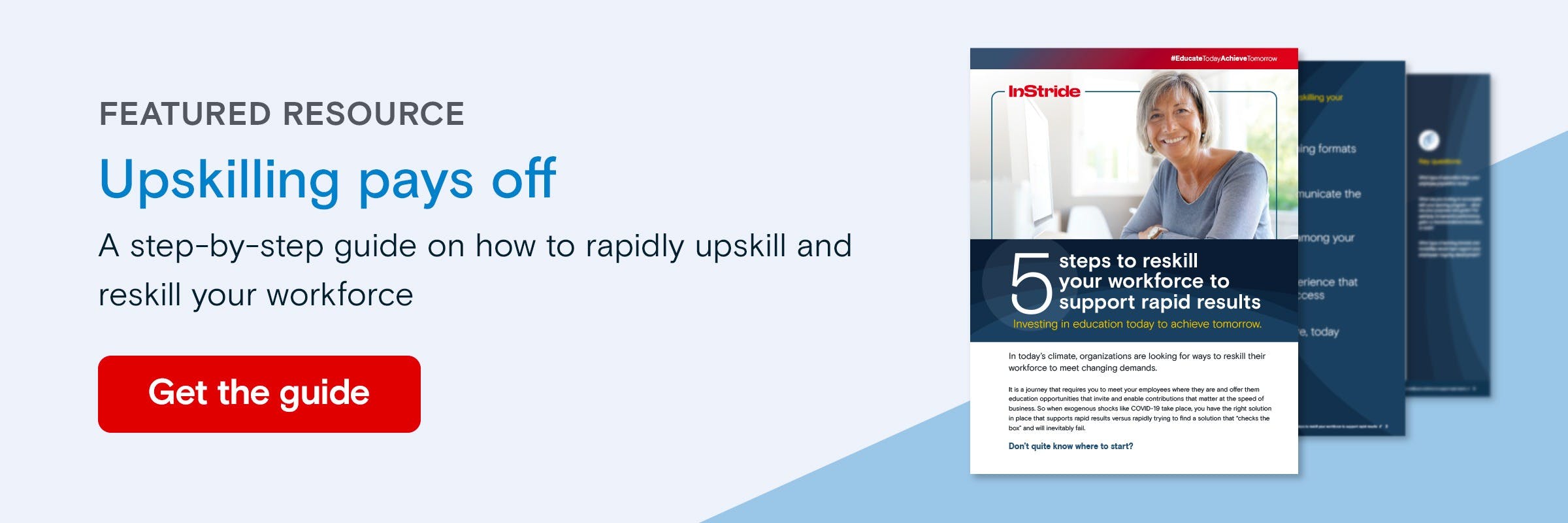Continuous employee development is something people leaders strive to encourage within their organizations. But in order to successfully integrate development into the fabric of your company's culture, your people need to be on board and have a mindset oriented towards learning and growth.
In the wake of digital transformation, effective learning and development (L&D) initiatives are critical to the long-term survival of your business. But your employees, teams and company as a whole have to be willing and able to take advantage of those resources to support forward motion at both the individual and team levels. Having a growth mindset is the fuel that keeps your people eager to gain new skills, refine existing competencies and advance.
Let’s discuss what it means to have a workforce that’s growth-oriented and share several strategies you can leverage to encourage a growth mindset at the individual, team and organizational level.
How to encourage a growth mindset at work
A growth mindset describes when work habits extend beyond doing the bare minimum and instead focus on continuous improvement in performance, productivity and expertise. This is in contrast to a fixed mindset, which views complacency as the default.
Many individuals naturally have a growth-oriented outlook towards their work, but this isn’t true for everyone. That’s why it’s important for people leaders to think about how to promote this attitude and integrate it into the existing learning culture of the company.
Here are a few examples of how to encourage growth-oriented thought:
- Reward effort and learning
An employee's efforts to grow must be acknowledged, regardless of whether or not the results greatly improve performance or productivity. This helps your people feel lauded for their efforts, rather than reprimanded for their failures. - Prioritize progress over goal completion
In today’s rapidly changing workforce landscape, the end goal of L&D is a constantly moving target. Rather than focusing on a final signifier of development, the continuous process of learning and improvement should be the thing that both L&D leaders and employees strive for. This approach reinforces ongoing growth as the ultimate goal. - Encourage experimentation and imperfection
Facilitating a culture of perfectionism in learning does nothing to support actual growth and may alienate your employees rather than motivate them. Encourage team members to do their best, provide them with the tools they need to succeed and let them know that making mistakes is just part of the learning process.
It’s likely that your organization has already employed one or multiple of these tactics already. The most important thing to be aware of is how to encourage these actions among the people within your organization that are the most influential: people managers and others in leadership.
It’s your management and leadership teams that are working directly with employees towards long-term skills development and career advancement. Actively promoting growth across all levels of management is the first step towards spreading this sentiment to everyone within the business.
Growth mindset at the organizational level
Although most L&D efforts focus on development at the individual level, it’s important to take a step back and identify how those individual efforts feed into overall company objectives.
Here are a couple of ways to align corporate growth with individual development:
- Drive learning culture through the C-suite
Like many components of company culture, the concept of growth has to start with leadership first. When the executive team adopts growth-minded values, that attitude can start to shape and influence the learning culture within the rest of the organization. - Align business goals with L&D strategies
Your organization’s individual growth initiatives should be leveraged to support development of the company at large. Start by taking a look at what your company needs to achieve in order to reach its next phase of expansion and growth. You can then reverse engineer what learning needs to happen at both the departmental and individual levels in order to make that happen.
Growth mindset at the team level
Individual performance is best utilized in support of the larger team and its goals. Here are a few tips for fostering a unified mindset that supports departmental development:
- Define individual contribution to team growth
Your teams will function best when individual contributors have a clear understanding of how their work affects the group’s performance and goals. This starts with clearly defining roles and responsibilities. - Demonstrate team effectiveness
Help your individual teams and departments understand their importance within the greater organization by regularly showing them how their efforts affect or contribute to organizational growth. - Provide access to team-wide development resources
Simply put, teams should have the means to engage in learning opportunities that contribute to team performance by cultivating individual competency. This can include things like team-wide training workshops, the ability to attend relevant events and/or seminars and even more robust initiatives such as educational opportunities.
To take it a step further, make it clear how these learning opportunities coincide with career development within a team. Encourage employees to take part by aligning their learning to clearly defined career outcomes, such as a promotion into a future role or the ability to move to a different team.
Growth mindset at the individual level
When individuals adopt a growth mindset, the outcomes of their own professional development can directly impact their colleagues, their team as a whole and even the business overall.
Here’s how to foster growth-minded thinking among individual employees:
- Provide employees with a personalized learning experience
Avoid engaging learning programs with a “one-size-fits-all” approach. Employees come from a variety of educational backgrounds and varying levels of experience that directly impact the level of learning and education necessary for their development.
Consider personalized learning programming, such as a strategic workforce education program, that meets learners exactly where they are in their journey and makes continuous learning accessible. - Demonstrate internal paths for growth
Motivate your employees by demonstrating the potential career outcomes that are possible if they take advantage of the learning and development opportunities that are available to them. Developing new skills and pursuing a credential or working towards a degree while being employed full-time is a significant commitment. Employees want to know that these opportunities are going to be worth their time and effort.
From a business standpoint, this approach helps to support internal mobility, fill skills gaps and build an internal talent pipeline for future positions. Cultivating a growth mindset is the foundation of an effective L&D strategy that will help your business prepare for the advancements and unforeseen disruptions within your industry. When your people are constantly evolving, their skills become future-proof, and so does your business.
Did you know? 82% of executives report developing a talent pipeline for leadership as one of the most pressing challenges today. Learn how business leaders are addressing this challenge and unlock more insights like this by downloading our latest report.


